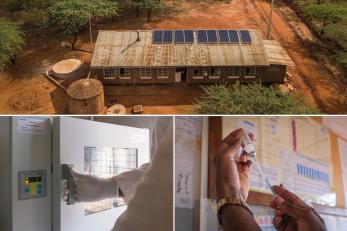Project Jua clinics serving as rural vaccination hubs in Kenya thanks to reliable refrigeration

Kichangachini, a small health clinic in the remote county of Taita Taveta in Kenya, has become an important rural vaccination hub thanks to a recently installed solar system that provides steady electricity to refrigerate vaccines for common viruses and diseases, including COVID-19. The solar system has enabled the clinic to safely store and distribute doses of AstraZeneca, Moderna, Pfizer and Johnson & Johnson vaccines supplied by the Health Ministry to serve local communities lagging behind the national vaccination rates.
Kichangachini is one of 8 rural clinics electrified by Energy 4 Impact and the OVO Foundation, as part of their Project Jua (‘sun’ in Swahili), that have been enlisted to support the Kenyan government’s efforts to ramp up its mass vaccination drive and get the needle into the arms of hard-to-reach remote communities.
The clinic administers vaccines for common diseases such as PCV 10, tetanus, IPV, BCG, measles, HPV and OPV, but the hard work of medical staff at Kichangachini has been stymied by a lack of reliable refrigeration. When their vaccine fridge was connected to the grid, power outages occurred two or three times a month, often for many hours at a time. When the power was down, the clinic relied on a back-up supply of gas canisters to keep the fridge in operation, a comparatively expensive source of energy. However, when the gas ran out, clinic staff were forced to transport the doses to another clinic to be stored in their fridge until the power was restored.
It was always very stressful when the power cut out. We had to find a local driver with a motorbike to take our vaccines as quickly as possible to a clinic 10 kilometres away. We did everything we could to ensure that valuable doses with the power to save lives would not go needlessly to waste.
Maryann Mwamengi , Nurse and officer in charge
Energy 4 Impact installed a 2.385 kWp stand-alone solar PV system at Kichangachini in October 2020. The system provides reliable power for medical equipment such as autoclaves, oxygen monitors, nebulisers and heaters, indispensable for ensuring better and safer outcomes for patients, whilst also keeping the 150-litre specialist vaccine fridge, supplied by the Ministry of Health as part of the Kenya Expanded Programme on Immunization initiative, in continuous operation.. Since December 2021, Kichangachini has administered doses to more than 600 patients, a significant portion of their catchment population of around 2,700 people across a radius of 7km, with the clinic currently in the process of administering second doses and boosters. Nurses with vaccine carriers also went out into the community to reach patients unable to travel to the clinic because of reduced mobility or poverty.
Patients at the clinic have expressed relief at the well-organised rollout of the vaccines in their area.
I’ve lived in fear of contracting Covid since the onset of the pandemic. I now feel much safer and better prepared to fight the virus should I get exposed. It means so much that me and my family can return to a more normal life.
Helen Chari , Resident
Maryann Mwamengi also notes how smooth power supply has been pivotal to the success of the campaign: "Inconsistent refrigeration used to make our job harder, but now we can control viruses and diseases in our community more effectively."
As of March 2022, Kenya has administered 17 million vaccines and 15% of its population is fully vaccinated. The Kenyan government is now ramping up its mass vaccination drive and aims to double its vaccination rate by June and rural clinics will form a key part of that strategy. The eight clinics in Taita Taveta taking part in the Covid-19 vaccine rollout have so far been able to vaccinate roughly 5,000 people.
Enabling the more effective distribution of vaccinations is far from the only goal of Project Jua which has electrified a total of 54 rural health clinics across the rural counties of Kwale, Kilifi, Taita Taveta, Turkana and Isiolo. Solar power improves health outcomes and saves lives by enabling the use of electric lighting and medical equipment. It allows medical staff to carry out safer deliveries on maternity wards, see more patients during the day and provide emergency treatment at night, offer more effective treatment by running diagnostic machines, track patient records more efficiently with computerised filing, and provide a safer and cleaner facility for staff and patients. Overall, just over 400,000 rural patients in Kenya have received better healthcare after the electrification of their local clinics.